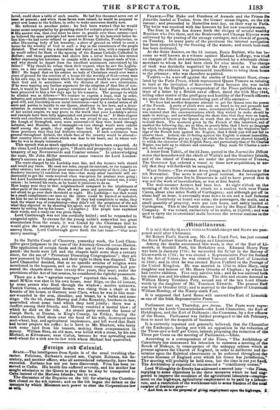,foreign ant Irolonial.
Brent.—The intelligence from Spain is of the usual revolting cha- racter. Feliciaao, Zurbano's second son, Captain Baltanas, his Se- cretary, and another officer, who all surrendered voluntarily, have been executed. Zarbano has not yet been discovered. Prim has been re- moved to Cadiz. His health has suffered severely, and his mother has sought admission to the Queen to pray that he may be transported to Cabs instead of the Mariana Islands ; but in vain.
The discussion of the Deputies on the bill for altering the Constita- lion closed on the 4th instant; and on the 5th began the debate on the Measure by which Ministers seek power to alter the Corporations-law et wdli FRANCE.—The Duke and Dutchess of Aumale and the Prince De Joinville landed at Toulon, from the Gomer steam-frigate, on the 5th instant ; and proceeded to Marseilles next day, on their way to Pant The bride was received with due honours by her new countrywomen. The frost in Paris has drawn forth the sledges of several wealthy Russians who live there, and the Boulevards and Champs Elysees were enlivened by the passing of the strange carriages, and crowds of gazers on Tuesday. In many parts of the provinces the internal navigation has been suspended by the freezing of the waters ; and much beet-rodt has been destroyed.
At the Seine Assizes, on the 3d instant, Denis Barbier, who has be- come so well known as a witness against Madame Laffarge, was tried on charges of theft and embezzlement, preferred by a wholesale china- merchant to whom he had been clerk for nine months. The charge of theft was decidedly negatived by the Jury ; and as to the other charges, the evidence was pronounced insufficient to bring them home to the prisoner ; who was therefore acquitted.
TAHITI.—As a set-off against the stories of Lieutenant Hunt, circu- lated by the Paris Presse, which represented Queen Pomare as refusing to land at the invitation of Governor Bruat because she was under coercion by the English, a correspondent of the Times publishes an ex- tract of a letter by a British naval officer, dated the 25th May 1844, telling other stories of the profligacy and hostility of the French officers: we quote the first and most interesting part of this extract- " We have had another desperate attempt to get the Queen into the power: of the French. A party of chiefs were sent on board to try and persuade her to go on shore. These gentlemen came, accompanied by a French officer. It was insisted that the communications which they wished to make should be made in writing; and notwithstanding the short time that they were on board, they contrived to annoy the Queen so much that she was obliged to go below to avoid them. The accounts given by the French of this interview, and of another the following day, are so false, so grossly false, that I have no league&
by which to designate them. The facts are so coloured by the vindictive feeds.
ings of the French here against the English, that I think you will not fail to observe them. Indeed, the ill-feeling against the English is almost incredible.. The officers of Marine got up a play, (at which the Governor showed himself') in which the character of the English Navy, and particularly that of Sir Charles Napier, was held up to ridicule and contempt. They made Sir Charles a cow- ard, fool, and rogue." A letter from Tahiti., of the 2d June, quoted in the Journal des Debaft states that henceforward the chiefs of Wallis's and the Gambier Islands and of the island of Fontana, are under the protectorate of Francs, The Governor has ordered a vessel to these new acquisitions, 10 nor tify that they will forthwith be occupied.
WEST INDIES.—The steamer Avon brings mails from Jamaica to the 8th November. The news is not of great interest. An investigation into a great plantation fire in Demerara is said to have proved that it was not the work of incendiarism, as was at first feared.
The mail-steamer Actaeon had been lost. At eight o'clock on the morning of the 20th October, it struck on a sunken rock near Pants Canoa, about nine miles North of Carthagena ; and although got off is about half an hour, it eventually went down iu six and a half fathoms water. Everybody on board was calm; the passengers, the mails, and small quantity of property, were put into boats, and safely landed at Carthagena. This is the fourth steamer lost by the Royal Mail Stems Company. It was valued, exclusively of its stores, at 25,000/.; and was used to carry the in:ercolonial mails between the several stations in the West Iudies.


























 Previous page
Previous page